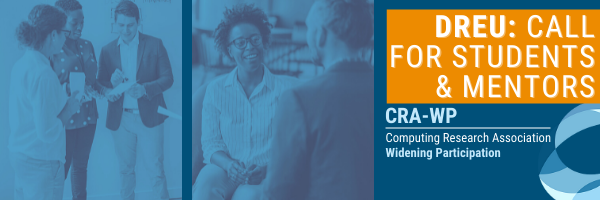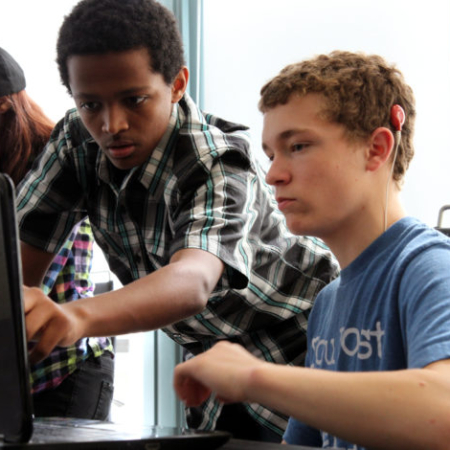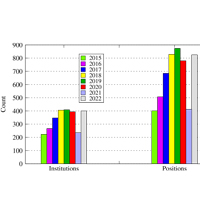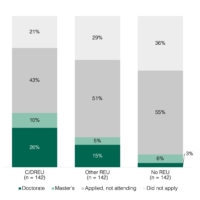Expanding the Pipeline: Recruiting and Retaining Computing Students through Research Experiences for Undergraduates

As efforts to broaden computing have become more diverse, inclusive, and just, despite increasing enrollments in computer science, the percentages of historically excluded students have not changed much and many institutions are struggling to retain them. Research Experiences for Undergraduates (REUs) are designed to introduce undergraduate students to research and present active training opportunities that may lead to students pursuing advanced academic degrees. Students are exposed early in their academic careers to research as problem solving, and therefore can develop critical thinking skills independently of coding skills. REUs provide an alternative source of funding while engaging with faculty and mentors who can nurture their interests and provide encouragement to persist in their degree program, often prior to declaring a major. In addition to providing early research engagement opportunities for first year and second year students with insufficient experience to compete for cooperative and summer internships, applying to and participating in REUs provide experience navigating application requirements (including writing a personal statement and gaining strong letters of recommendation, which helps them get to know faculty and vice-versa), collaborating on a project, and building a set of skills that would make them an attractive graduate school applicants. REUs are especially beneficial for first-generation, community college, and non-traditional students who may have limited exposure and access to graduate school, the application process, and hands-on opportunities to explore the field more deeply.
We share some key insights that have been gleaned from evaluation reports of mentors and participants in the CRA Committee on Widening Participation in Computing Research (CRA-WP)’s Collaborative Research Experiences for Undergraduates (CREU) and Distributed Research Experiences for Undergraduates (DREU) programs and our own firsthand experiences working with and mentoring undergraduate students.
“Participants indicated the most satisfying aspects of CREU related to the ability to learn new things, conduct and disseminate research, and work with a team of students. Participants were particularly pleased with knowing their research had made a positive impact on others, in both their own community and in communities around the world. Many participants expressed appreciation for their mentor and working with their teammates. Others were enthusiastic about producing work that was not only submitted to conferences but could be highlighted on their resumes for future job and graduate school applications.” 2017-2018 CRA-W CREU Participant Feedback Report.
This month, the CRA Center for Evaluating the Research Pipeline (CERP) published an analysis that showed students who participated in CRA-WP’s CREU and DREU programs pursue graduate degree in computing at higher rates than students who participated in other REU programs and students who did not participate in an REU program.
 As the academic landscape continues to compete with the tech industry for talent, what can faculty do to help students persist in the degree, consider the myriad of career opportunities available to them, and gain an appreciation for the longer-term employment picture that a research career may offer?
As the academic landscape continues to compete with the tech industry for talent, what can faculty do to help students persist in the degree, consider the myriad of career opportunities available to them, and gain an appreciation for the longer-term employment picture that a research career may offer?
- Demystify the term “research”, repeatedly, and often. Connect research to questions these students have about how technology works, how it should work, who it works for and who it leaves out, and how their involvement can improve the lives of those they care most about. Cultivate their natural curiosity and direct it into areas that they can explore and practice writing research questions that may lead to a field of inquiry. Teach them how to scope and bound their exploration so they can confidently complete an activity and continue their exploration.
- Encourage individual students to apply. In addition to advertising opportunities to all the students in a class, reach out to several of them and individually encourage them to apply. This could be a short sentence on a homework based on something they wrote that hinted at the ability to think more deeply about the assignment, insightful questions asked in class or in a lab, or visits during office hours. Many historically excluded, first-generation, and non-traditional students may be unaware or lack confidence in applying to an REU program or think that they are unable to afford graduate school. Be highly aware of the biases that creep into evaluations of who can be successful as you assess who to encourage.
- Share personalized journeys of persistence and adversity, as well as successes. Sharing how you and your mentees navigated career paths, gained both financial and emotional support, built supporting communities and networks, submitted papers, got past letters of rejection – will help students discover their own resilience and resourcefulness, and gain confidence in their growing expertise to pursue their chosen field of inquiry.
- Host REU application workshops in your department. A one-hour session of what is involved in writing a personal statement, how to get strong letters of recommendation, and ways to get involved to add meaningful experiences to their resume, like doing K-12 outreach, participating in a student organization, working in a computer lab, organizing a hack-a-thon, going to a technical or professional conference – all of these help the students connect with other like-minded students to build their own support networks that reinforce a sense of belonging. A second hour can be a working session with graduate students and outreach program directors to create a draft application.
- Consider first year students and sophomores for REU opportunities. Many students will be looking for industry internships after their junior year. Meanwhile, second semester students and sophomores are still open to multiple career paths and will have more difficulty competing for these internships. Distributed REUs offer an environment to work collaboratively with researchers and participants from different institutions, opening richer opportunities for getting an advanced degree. Participating in an REU that is well managed gives these students exposure to project work, which is key to building a sense of belonging, shared ownership, and self-confidence, and lessens impostor syndrome. These are critical aspects of retention and enables them to compete for future REU and internship experiences.
- Support interdisciplinary interests. Students may be interested in a field of inquiry that spans one or more departments. Connect them with faculty in other departments who are supportive of this type of exploration. Even if they choose to minor in computing, they may eventually pursue an advanced degree in computing. Many rich areas of research are found at the intersection of multiple disciplines.
- Create an avenue for REU participants to share their work. The strong sense of accomplishment they obtained from a positive experience can open the door to deeper exploration, especially as they get questions from their audiences. Coach them on how to answer questions that fall outside of their area of expertise so they can practice maintaining their composure and self-confidence. This enables them to become near-peer role models and mentors for other students who are curious about these programs. Encourage them and advocate for them within your department to apply for travel scholarships to conferences to present their work.
- Ensure the REU experience is a positive one. If you manage or sponsor an REU program, set clear guidelines for the faculty and mentors about the time commitment needed and clear goals and project deadlines for the participants. Host specific training on unconscious bias and how to mitigate it, and ensure labs, buildings, and housing are accessible to people with disabilities. Advertise it broadly outside of your organization, especially outside of close networks to Historically Black Colleges and Universities (HBCUs), Hispanic Serving Institutions (HSIs), Tribal Colleges and Universities (TBCUs), Asian American and Native American Pacific Islander Serving Institutions, (AANAPISI), and feeder community colleges. Offer accommodations to all students so those with disabilities can make use of them without asking. Be thoughtful about how students will engage with each other, as well as their experience outside of the classroom or lab. Assess the REU program experiences from past participants to incrementally improve your program. For distributed REUs away from the home campus, traveling to a different state, working in a new lab, living away from home in unfamiliar surroundings can overwhelm participants struggling with impostor syndrome or anxiety. It is critical that the housing and transportation be vetted as safe and not left to an inexperienced participant to struggle to feel secure outside of the research environment. Provide both positive and negative feedback to REU programs your students participated in so that they can address the negatives and reinforce the positives.
Perhaps the single most important factor to convince a student to engage in an REU program is the personal encouragement by a faculty member or mentor to pursue such an opportunity. Actively dismantle the myth of meritocracy and stereotypes of innate “genius”. Bias can creep into estimations of what a “successful” student looks like academically, based on what courses they have taken, where they went to high school, and prior computing experience, and it takes focused effort to avoid the same biases in assessments of who will be successful pursuing an advanced degree.
To meet students “where they are”, consider the general strategy of identifying and nurturing student interests and determining how best to close the gaps in their knowledge and experiences through a research experience. Examples of such “bridge research experiences” include a well-designed research project focused on learning a specific skill or technology, working collaboratively with a more experienced student who is interested in mentoring others, or a multi-student project with similarly positioned students who can co-learn the material and experience a supportive environment. It should never be too late to expose students to a research experience in their discipline.
The CRA-WP DREU program is accepting applications through February 15, 2022 here. NSF REU programs can be found here.
About the Authors
Dr. Patty Lopez is currently an Intel Encore Computer Science Fellow at New Mexico State University (NMSU), a Hispanic Serving Institution where she is a distinguished alumna. Prior to her role at NMSU, she spent 13 years as a Platform Application Engineer at Intel and 19 years as an imaging scientist and software developer at Hewlett-Packard. Patty has seven patents and over 20 years of experience in diversity and inclusion work. She is a member of the CRA-WP Board, the Computing Alliance for Minority Participation Board, and the National Academy of Sciences, Engineering, and Medicine’s Roundtable on Systemic Change in Undergraduate STEM Education.
Dr. Soha Hassoun is Professor and past Chair of the Department of Computer Science at Tufts University, where she holds secondary appointments in the Department of Chemical and Biological Engineering, and the Department of Electrical and Computer Engineering. Soha’s research is currently at the intersection of machine learning and systems biology, developing tools and analysis techniques to provide insight into complex biological systems. She provided research mentorship to many undergraduate research students that have pursued PhDs in Computer Science and other advanced degrees. Soha is a member of the CRA-WP Board, and former co-chair for the CREU program.
Patty and Soha serve as editors for the Expanding the Pipeline column in Computing Research News.









